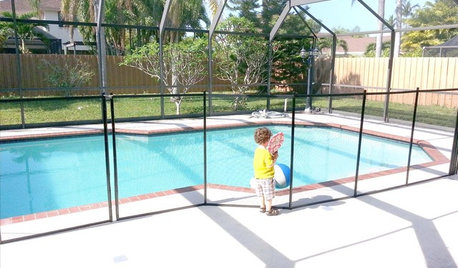Cryptosporidium danger in pools
womanowned
10 years ago
Related Stories

PETSPet-Proofing Your Home: A Room-by-Room Guide
Not all pet dangers are obvious. Keep furry friends safe and sound by handling all of these potential hazards
Full Story
PETSGarden Alert: 22 Plants to Keep Away From Pets
Avoid potential danger by keeping dogs and cats away from these landscaping and houseplant favorites
Full Story
LANDSCAPE DESIGNNatural Swimming Pools: More Beauty, No Chemicals
Keep your skin and the environment healthy with a pool that cleans itself, naturally
Full Story
POOLS8 Ideas for Petite Pools
Modest in size but big on looks and function, pools like these offer a private swim space without requiring lots of room
Full Story
GARDENING AND LANDSCAPINGPlan for Summer: Protect Your Family With a Safe Pool
Fencing, presence detectors and non-slip materials help keep your pool area accident-free
Full Story
HEALTHY HOMEThese Steps Will Help Keep Kids Safe Around Pools and Spas
Implement several layers of security to prevent life-threatening accidents in and around the pool
Full Story
GARDENING AND LANDSCAPINGEnjoy Your Pool Long Past Labor Day
Don't give your pool and patio the cold shoulder just because the air is chillier. New accessories can help foster a warm relationship
Full Story
POOLSSolstice Daydream Break: 10 Breathtaking Swimming Pools
Put Jack Frost's nipping out of mind with a virtual dip in 10 covetable Australian swimming spots
Full Story
GARDENING AND LANDSCAPING12 Naturally Beautiful Hot Tubs
Prefer a no-plastic look for your patio or yard? Wood, stone and concrete make these hot tubs fit right in with nature
Full Story
LANDSCAPE DESIGNSecrets of a Successful Water Garden
Relax. Having a water garden is much easier once you understand the basics
Full Story







c9pilot
Related Professionals
Forney Swimming Pool Builders · Santa Paula Swimming Pool Builders · Rocky Point Swimming Pool Builders · Grand Haven Landscape Architects & Landscape Designers · Owings Mills Landscape Architects & Landscape Designers · Parole Landscape Architects & Landscape Designers · Tomball Landscape Architects & Landscape Designers · Waterbury Landscape Contractors · Desert Hot Springs Landscape Contractors · Fort Payne Landscape Contractors · Goodlettsville Landscape Contractors · Pompano Beach Landscape Contractors · Fort Worth Decks, Patios & Outdoor Enclosures · Knoxville Decks, Patios & Outdoor Enclosures · Rantoul Decks, Patios & Outdoor Enclosures